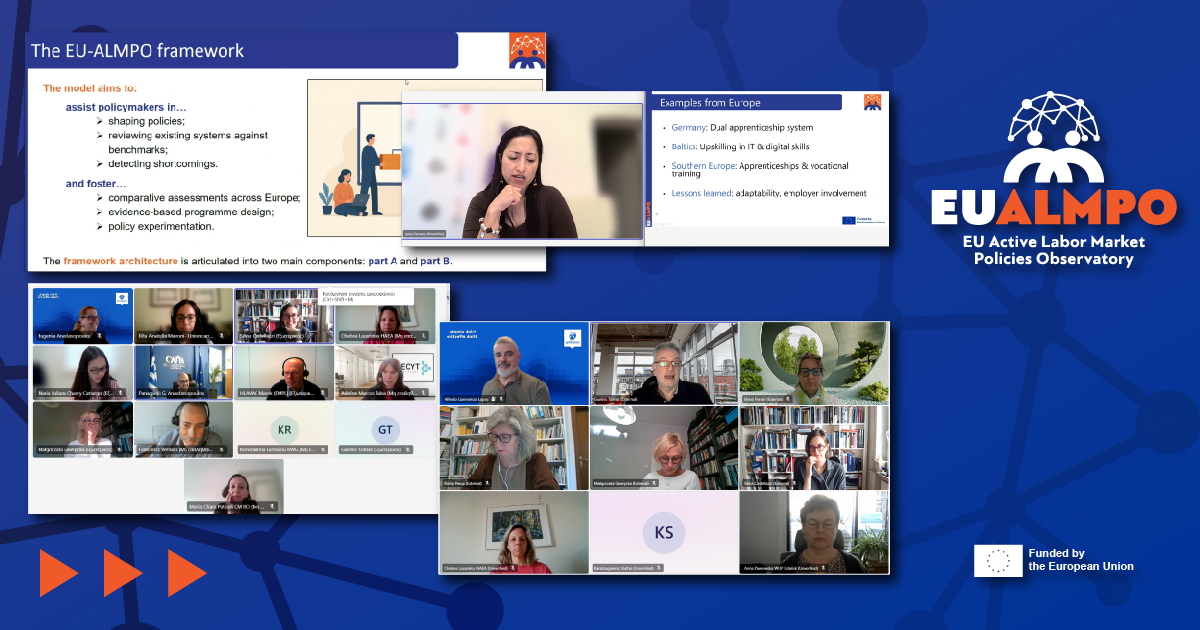We are excited to announce the successful completion of the EU-ALMPO Validation Workshop for the analytical framework, held online on 26th September 2025, hosted and facilitated by IRS (Istituto per la Ricerca Sociale).
The event marked a major milestone in validating the project’s analytical and technological framework, bringing together partners, selected national and EU-level experts, and members of the Advisory Board to exchange insights on how Active Labour Market Policies (ALMPs) can better address Europe’s evolving skills challenges and to engage them in a structured discussion aimed at reviewing and strengthening the core research framework.
A Collective Effort to Refine the EU-ALMPO Framework
The workshop aimed to test and validate the EU-ALMPO analytical framework, which will underpin the development of the project’s AI-supported observatory and decision-support tools for policymakers. Through interactive sessions and breakout discussions, participants explored the framework’s conceptual clarity, practical relevance, and applicability across diverse European contexts.
The event opened with a keynote by Kenia Parsons and Sandor Karacsony from the World Bank, who highlighted the global and European perspectives on ALMP effectiveness. They emphasized that ALMPs remain essential instruments for promoting inclusion, addressing skills mismatches, and supporting workforce adaptability amid technological, demographic, and green transitions.
Streamed Discussions: From Skills Mismatch to Policy Design
The day was structured around three thematic streams coordinated by IRS and Gdańsk University of Technology (GUT):
- Stream 1 – Skills Mismatch, ALMPs, Policy Scope and Targets
Led by Dr. Flavia Pesce and Siro Ciarimboli (IRS), this session examined how ALMPs interact with skills mismatches, emphasizing the need for clearer policy classifications and stronger targeting of vulnerable groups such as women, migrants, and low-skilled workers. - Stream 2 – Trends and Factors Shaping Mismatches
Presented by Silvia Castellazzi and Maria Juliana Charry Camargo (IRS), this stream explored the driving forces behind labour market frictions — from technological change and the green transition to demographic and migration dynamics. Participants discussed how governance, education, and innovation systems can enhance ALMP effectiveness. - Stream 3 – Determinants of ALMP Effectiveness
Moderated by Łukasz Sienkiewicz and Katarzyna Stankiewicz (GUT), the discussion focused on evidence from over 300 studies and meta-analyses, identifying key determinants of success: programme design, target group characteristics, contextual conditions, and evaluation mechanisms.
The Technological Dimension: From Framework to Functionality
University of Peloponnese presented the EU-ALMPO Technological Infrastructure, showcasing how AI and data-driven tools will support policymakers. The platform will feature the ALMPO Repository, Document Annotator, and Wizard—an interactive system enabling users to design, compare, and evaluate ALMPs with evidence-based recommendations and real-time data.
Engaging Policymakers Through the “Wizard” Prototype
IRS introduced the “Servuction Model” and user-centered design process that connects the analytical framework to the technological tools. This approach ensures that the Wizard serves as a practical, empathic assistant for policymakers, offering tailored guidance, best practices, and checklists for designing inclusive labour market measures.
Towards a Data-Driven and Inclusive European Labour Market
The workshop successfully validated the conceptual and operational structure of the EU-ALMPO framework. The active participation of all partners and the valuable contributions from experts confirmed the project’s relevance and potential to reshape how ALMPs are designed, implemented, and evaluated in Europe.
As Prof. Giannis Tzimas, project coordinator, underlined during his presentation, EU-ALMPO seeks to revolutionize the way Europe approaches labour market policy — making it more data-informed, inclusive, and responsive to the rapidly changing world of work.
We thank all participating experts for their invaluable contributions, ensuring the EU-ALMPO Observatory will serve as an effective, evidence-based instrument for enhancing labour market integration and skills matching across Europe.
